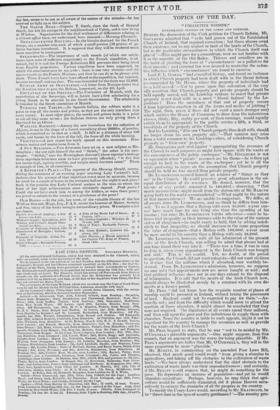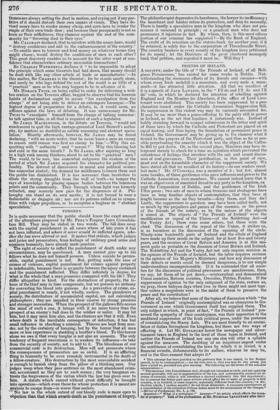TOPICS OF THE DAY.
" COLLECTIVE WISDOM."
REMARKABLE SAYINGS OF THE LORDS AND COMMONS. ,
DURING the discussion of the Cork petition for Church Reform, GOULBURN admitted that " evils had grown out of the Established Church of Ireland, that required correction ; but these abuses owed their existence, not to any neglect or fault of the heads of the Church, but to the particular cireionstancee in which the Church itself was placed."-This might pass for a conundrum, were we not familiar with it as the morality of the Old Bailey. Thieves and swindlers are in the habit of pleading the force of " circumstances" as ft palliative for their pursuits : and criminal law was devised to neutralize the seduc- tive influence which " circumstances" are found to exercise.
Lord F. L. GOWER " had c6nsulted history, and found no instance in which Church property had been dealt with in the liberal fashion recommended by Mr. Hums, where the property of individuals had been held sacred."-Not to pause upon this reiteration Of the very silly assertion that Church property and private property should be held equally sacred, will his Lordship venture to assert that private property is not dealt with in a most " liberal fashion" by the Le- gislature ? Does the sacredness of that sort of property secure it from legislative exaction in all the forms and modes of jobbing ? The right, then, (even if there did not exist a much stronger one) which entitles the House of Commons to draw from the industrious classes, thirty, fifty, eighty per cent. of their earnings, would equally entitle them to appropriate to the public service a-fifth, a third, or two-thirds of the property of the Church. But his Lordship, " if he saw Church property thus dealt with, should no longer deem his own property safe."-That opinion may arise from a habit common to his Lordship's class, of considering Church property as " their own" property. Mr. GO ULB URN protested against " appropriating the revenues of the Church to such purposes as might best square with the wants or the conveniences of the public exchequer."-Mr. GOULBURN is not so squeamish when " private" revenues are his theme-he is then apt enough to look to the wants of the exchequer; yet he is all the while professing to argue on the assumption that Church property should be held no lese sacred than private property. Dr. LUSIIINGToN avowed himself an admirer of " things as they are" in the Church. He could perceive great advantages in the un- equal distribution of its revenues. He denied, however, that the income of any prelate amounted to 100,00(11.; observing, " that much inconvenience might result from the statements of Mr. B ART NG going forth to the world uneontradicted."-What might be the nature of that inconvenience ? We are linable to conjecture. We differ, at all events, from Dr. LUSHINGTON, and we think he differs from him- self. To us it. appears that a Bishop with even 30,000/. a-year can- • not have much time for any thing else than the spending of his income ; but since Dr. LUSHINGTON thinks otherwise-since he be- lieves that inequality in their incomes adds to the value of the various orders of Clergyillen--711e ought surely to hold, that by adding indefi- nitely to that inequality, we should increase in the smile proportion the value of clergymen-that a Bishop with 100,000/. a-year must be more useful to his country than a Bishop with only 30,000/. Dr. LUSHINGToN, however, wills all his admiration of the present • state of the Irish Church, was willing to admit that abuses had at one time found their way into it. "There was a time, it was in vain to deny it, when every appointment in the Irish Church was bought and sold." This is too candid. Yet, no doubt, at the penod in question, the Church did not want eulogists-did not want civilians to declare that the millions which it absorbed, were worthily be- stowed. From Dr. LUSHINGTON'S admission, however, we suppose we may infer that appointments now are never bought or sold ; and that political influence does not in our days extend to the disposal of bishopricks. It is odd that the merits of the Irish Church now,' should always be illustrated merely by a contrast with its own de-, merits at a former period.
Mr. PEEL "did not know how the requisite number of places of worship could be procured in Ireland, without taxing the possessors of land. England could not be expected to pay for them."-M- suredly not ; and from the difficulty which would seem to attend the erection of these churches, it might almost be concluded that they were not required. Tbe dignitaries at all events spend their millionS, and then call upon the poor and the industrious to supply them with churches. Since the country is liable to such appeals, might it not be expedient for the country to manage the revenues as well as provide for the wants of the Irish Church ?
Mr. PEEL begged to state, that he was "not to be misled by Mt. O'CONNELL'S plausible arguments."-One might suppose, from this' remark, that an argument was the worse for being plausible. If Mr. PEEL'S arguments are better than Mr. O'CONNELL's, they will in the same proportion be more "plausible." Mr. BENETT, in commenting on the amended Poor Laws Bill, observed, that much good would result "from giving a stimulus to agriculture, and taking off the obstacles to the cultivation of waste lands."-We have always understood that the chief obstacle to the cultivation of waste lands was their unproductiveness; and certainly,. If Mr. BENETT could remove that, he might do something for the poor. He deprecates an increase of population-and yet he Would, stimulate agriculture. Perhaps, however, he may think that agri-, culture would be sufficiently stimulated, did it please Heaven mira- culously to enlarge the stomachs of all the paupers in the country. To modify the Usury-Laws would, according to Mr. HE ATHCOTE, be to "throw, dust in the eyes of country gentlemen !"-The Country gen- tlenteit are always setting the dust in motion, and crying out if any par- ticles of it should disturb their own organs of vision. They have de- 'tised usury-laws to render money cheap, and corn-laws to render the ' staple of their own trade dear ; and because their perspicacity is not so keen as their selfishness, they clamour against the rest of the com- munity for " throwing dust in their eyes." Mr. CALCRAFT declared, that to interfere with the usury-laws, would " destroy confidence and add to the embarrassment of the country." —To enable men to borrow and lend money on whatever terms they raight choose, would destroy the confidence of men in each other ! This great discovery enables us to account for the utter want of con- fidence that characterizes ordinary mercantile transactions ! Sir CHARLES WETHERELL declares it " to be impossible to adopt the principle which some theorists had laid down, that money should be dealt with like any other article of trade or manufactures."—In this matter, Sir CHARLES is the theorist ; for he stands nearly alone, and surely he who lags behind the rest of the world is as little of a " practical " man as he who may happen to be in advance of it. Mr. HORACE Twiss, on being called to order for delivering a writ- ten oration on the Terceira affair, begged to observe that his forensic habits of declamation ought to secure "his exculpation from the charge" of not being able to deliver an extempore harangue.—The highest degree of preparation for a debate, is, it would seem, an offence against the laws of debating. It was unnecessary for Mr. Tvviss to " exculpate " himself from the charge of talking nonsense: to talk against time, is all that is required of such a legislator. Sir JAMES MACKINTOSH, in the debate on Terceira, "would not condescend to quit the high vantage-ground of Lord Stowell's autho- rity, for matters so doubtful as subtile reasoning and abstract specu- lation." Shortly afterwards, however, Sir JAMES may be found declaring, "with an acute writer, that he never knew a man an enemy to reason until reason was first an enemy to him."—Why this co- quetting with " authority" and " reason ?" Why this blowing hot and cold in the same breath ? Is Sir JAMES, after aspiring so long to a high rank among thinkers, about to rat to the " practical " men ? The world, to be sure, has somewhat outgrown the wisdom of the period at which Sir JAMES acquired his character for political pro- fkindity. The distrust of discoverers in moral and political science has somewhat abated ; the demand for middlemen between them and the public has diminished. It is less necessary than heretofore to dilute the strong draughts from the well of truth—to temper the rays of knowledge by placing opaque bodies between the luminous points and the community. They through whom light was formerly refracted, may scarcely now pass for the dispensers of it. Phi- losophy can stand on its own merits ; it is not bound to wear a fashionable or degagee air ; nor are its patrons called on to sympa- thize with vulgar prejudices, or to recognize a bugbear in " abstract speculation."



















 Previous page
Previous page